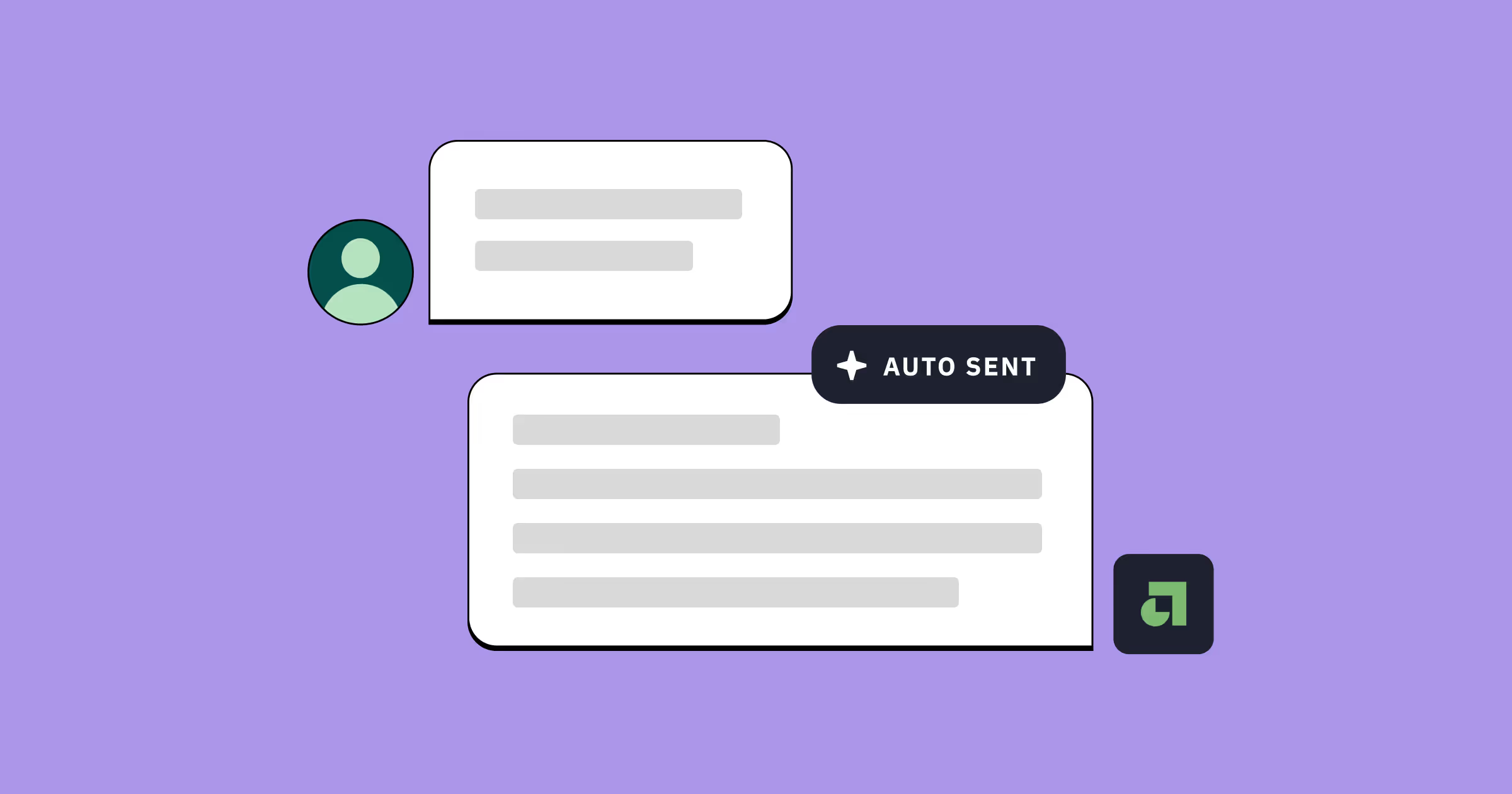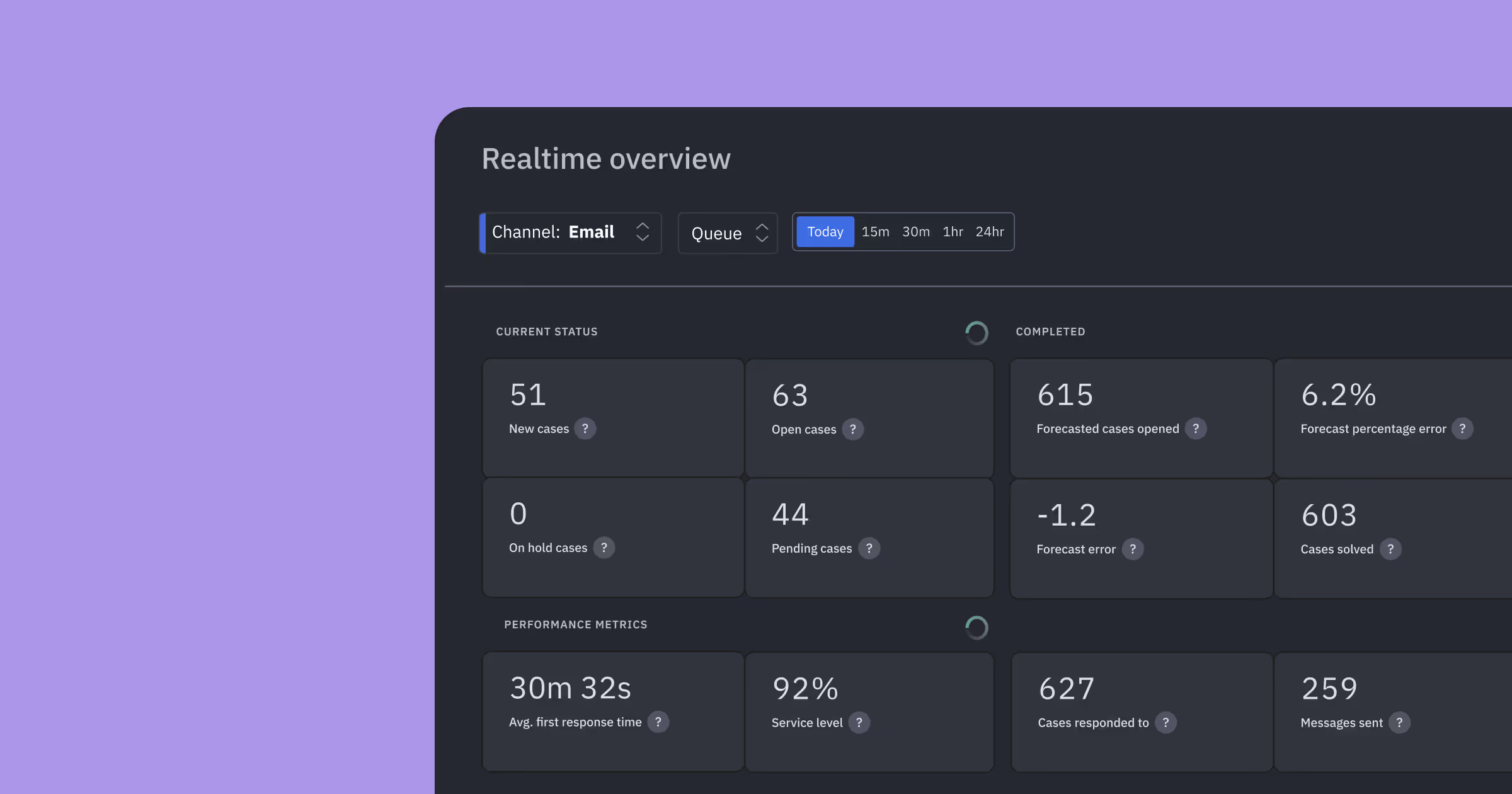Contact center AI copilot: A guide to better customer support
See demo
Your contact center provides support — but it also needs support. That’s where an AI copilot comes in. This technology empowers your agents with the real-time data, insights, and recommendations they need to consistently deliver faster, smarter, and more personalized support experiences.
What is a contact center AI copilot?
Let’s start with a definition of an AI copilot. An AI copilot uses artificial intelligence to complete tasks, suggest improvements, and offer insights. While many people use the terms “AI copilot” and “AI assistant” interchangeably, there is a slight difference to be aware of:

- AI assistant: Uses automation and AI capabilities to offer help and complete tasks based on existing rules and inputs
- AI copilot: Uses contextual awareness to provide real-time support and suggestions within a specific task
Both use natural language processing, machine learning, and the power of AI. But, put simply, an assistant is an AI-driven tool while a copilot is more of a proactive, collaborative partner.
With that context in mind, it’s easier to understand the role of a contact center AI copilot (sometimes called an agent copilot). This sort of AI solution helps contact center agents by providing insights, offering suggestions for improvement, and handling time-consuming tasks. This can include:
- Pre-drafting responses to customer issues or other customer interactions
- Automating workflows like ticket categorization, routing, and follow-ups
- Providing human agents with contextual suggestions, customer history, or related resources
- Offering real-time flagging, coaching, or training during customer interactions
- Tracking agent performance and identifying areas for improvement
The copilot isn’t just there to streamline workflows, optimize tasks, and improve operational efficiency (although, it does all of that too). It’s there to provide relevant, targeted, and contextual assistance to help agents improve customer engagement, boost customer satisfaction, and deliver an exceptional customer experience.
What are the benefits of an AI copilot for contact centers?
That explanation makes it fairly easy to see just how much of a difference-maker an AI-powered copilot can be for your contact center. But, let’s dig a little deeper into the benefits.
Increased efficiency
Efficiency comes up in nearly every conversation about AI. That’s for good reason: AI apps really can help your contact center team get more done in less time. Here are just a few examples of how this technology increases agent productivity and improves your service experiences:
- Automating routine tasks: From transcription of customer calls to automatically generating summaries of service interactions, an AI copilot can move routine and mundane tasks entirely off your service agents’ plates.
- Reducing average handling time (AHT): Whether it’s using generative AI to draft responses, immediately fetching relevant information from your knowledge base or other resources, streamlining workflows, or offering instant insights, AI copilots can significantly reduce the amount of time your agents spend on each customer interaction.
Improved customer experience
Think implementing AI comes at the expense of your customer experience — in the form of impersonal interactions and messages from bots? As counterintuitive as it might seem, an AI copilot can help your team provide even more exceptional service with:
- 24×7 availability: AI applications like chatbots and virtual agents can handle basic queries from your customers around the clock and use conversational AI to reply in a natural and human way. It’s a self-service support option that ensures your customers can always get the answers and help they need.
- Better personalization: According to McKinsey, 71% of customers say they expect companies to deliver personalized interactions. Your AI copilot can analyze your customer data in real-time to provide tailored recommendations, solutions, and responses.
- Improved consistency: AI agents and copilots ensure that your agents use (and your customers receive) consistent and accurate responses, which means less customer frustration and confusion.
Better agent experience
Your customers benefit, but so do your agents. With an AI copilot in place, your contact center agents get:
- Real-time guidance: AI copilots are focused on what’s called “agent assist” (meaning, they make your support agents’ lives easier) with suggested scripts, knowledge base links, data-backed insights, historical context, recommended next steps, and more.
- More manageable workloads: Burnout runs rampant among contact center agents. An AI copilot can lighten the load for your support team by chipping in with time-consuming tasks or by automating workflows entirely.
- Training assistance: Particularly for new agents, an AI copilot can help them onboard and continually improve through real-time performance feedback and targeted recommendations.

What are the challenges of using a contact center AI copilot?
An AI copilot offers plenty of advantages for contact centers, but there are several potential drawbacks to consider as well:
Data privacy and security
AI copilots rely on a lot of company and customer data, which can be confidential and sensitive. Look for AI systems that have strong security and privacy requirements, particularly if you work in a highly regulated industry.
Accuracy and understanding
AI copilots can make mistakes, and it takes time to fine-tune the tool’s contextual understanding and adherence to your brand voice. Too many errors along the way can cause agents to lose trust in the system.
Agent resistance
Even if agents aren’t worried about AI replacing them, learning to collaborate effectively with a copilot is a big change to their normal ways of working — and change is hard, even when it’s positive. Understandably, implementing a new AI system can lead to some pushback from your human agents.
Integrations with existing systems
AI copilots offer the most benefits when you configure them to work seamlessly with your existing tools, like your CRM,, ticketing platforms, or the other tools your team leans on. If your contact center relies on a lot of legacy tools, they may lack compatibility with your AI copilot.
How to adopt an AI copilot for your contact center
Like any change, implementing an AI copilot comes with some hurdles. However, they’re all manageable — especially if you're thoughtful and intentional about adopting this technology in your contact center. Here are three steps to do just that.
1. Start with your goals and pain points
It’s easy to fall prey to shiny object syndrome, particularly when every new tool or platform promises to be cutting-edge and transformational. But, there’s no point in introducing something new if it doesn’t address a real need. Before exploring your options, step back and do the following:
- Identify your pain points: What challenges do you need to address? Do you have unmanageably high call volumes? Long resolution times? Agent burnout and turnover?
- Set your goals: Now establish clear, metric-driven objectives related to your pain points (for example, reducing resolution times by 25% by the end of the first quarter).
When you do this, you define criteria you can use to narrow down your options, choose the right AI copilot, and monitor if it’s actually delivering what you need.
2. Evaluate your current and future needs
Consider your existing technology systems, like your CRM, ticketing platform, and communication tools. Do you intend to stick with all of those? Are you willing to replace or forego some? This gives you an idea of what integrations are crucial for your AI copilot.
Of course, you’ll also need to review your budget and determine how much you can spend on an AI copilot. There’s no point evaluating options you can’t afford.
And while you need to give some thought to what you need right now, it’s also smart to consider what you might need next year. Or even five years from now.
Do you anticipate growing your team? Introducing new support channels? There’s no reliable way to predict the future, but trying your best to be forward-thinking will help you choose a copilot that can grow with your business.
3. Be selective
You’ve laid the groundwork, and now you’re ready to research and choose an AI provider that aligns with your need, budget, and technical requirements.
The criteria you defined in the previous steps will be your guide as you filter through your choices. However, there are a few other features that are worth keeping an eye out for:
- Natural Language Processing (NLP) for conversational understanding
- Omnichannel support for consistent customer experiences across platforms
- Real-time analytics and reporting
- Customizations for your workflows, brand voice, and more
There are a lot of lofty promises and plenty of marketing hype in the world of AI. So, take your time reviewing your options, ask thoughtful questions of the support and sales teams, and dig deep into demos or free trials.
After all, an AI copilot is supposed to make things easier for your support team — but that only happens when you find the right fit.
Faster, smarter, and smoother support with Assembled Assist
Ready to start your search for the right AI copilot for your contact center? Meet Assembled Assist, an agent copilot and issue resolution engine powered by generative AI.
Your support team will benefit from real-time conversation assistance, auto-drafted replies, automated ticketing, and an intuitive workflow builder to configure powerful and targeted automations in minutes.
An AI copilot isn’t just another tool in your tech stack — it’s a context-driven, collaborative partner that empowers your contact center to deliver personalized support and top-notch customer experiences. Book your demo today to see how Assembled Assist can level up your support operations.






